This is a two-part series. In Part One, we discussed the issue of phone addiction, the increasing number of people considering giving up their phones altogether, and my own experience of going without a smartphone.
Now in Part Two, we’ll explore strategies for having a healthier and more productive relationship with your phone.
Smartphone addiction is our generation’s respectable sin.
A survey by the American Psychological Association found that nearly 70% of Americans believe they are addicted to their smartphones. Additionally, a study conducted by the Centers for Disease Control and Prevention (CDC) revealed that the average American spends 7.5 hours per day on their smartphone or other digital devices.
I am not implying that for Christians to use our phones is somehow sinful, or that using them for an extended time for work or even entertainment is wrong in itself. My focus is on how our phones distract us from our responsibilities and our relationship with God.
Because when 70% of people are self-reporting that they are “addicted” to their phones, that seems like a problem, doesn’t it?
There’s something deeply unhealthy about our increased dependence on our phones, and if you’re someone who feels that way too, I’d like to explore some of the ways we can wisely address that problem as Christians.
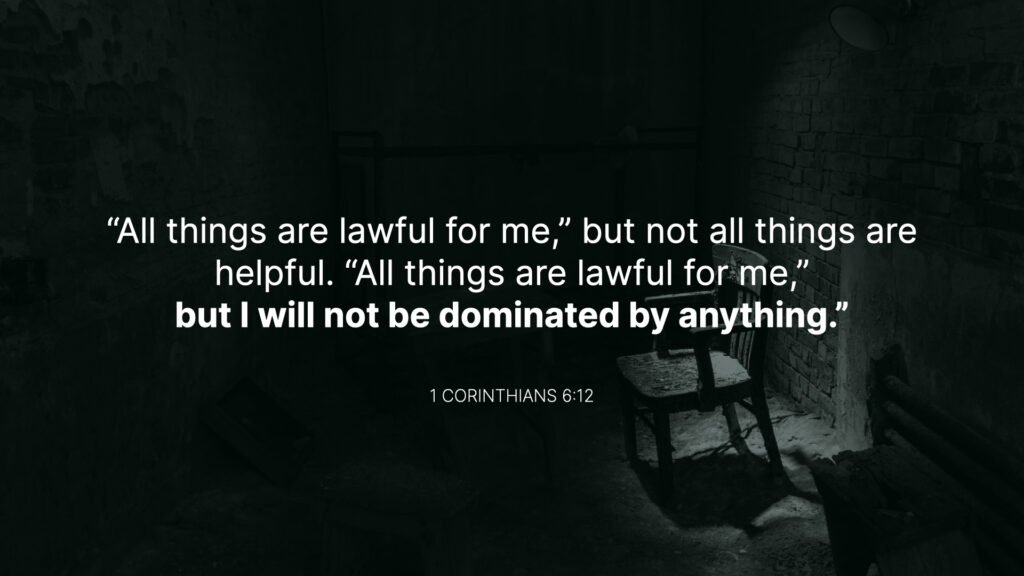
Emancipation Options
In the last installment of this series, we looked at whether completely abandoning our smartphones was a viable option or not. I concluded that this was probably not a long-term solution for most people as it:
- Forces us to forgo many of our phone’s genuine benefits. Think Bible apps, connection to friends and family, productivity apps, and access to information. These are legitimate positives, even if other aspects of our phone usage are negative.
- Unnecessarily encumbers us. The modern world is now ordered around the ubiquity of smartphones. So for most gainfully employed adults saying, “I don’t use a smartphone,” is about as realistic as saying “I don’t drive in cars.” The phones are here to stay.
So what are some practical actions we can take to negotiate a healthier relationship with our phones?
Here are five steps I’d recommend to a Christian who wants to develop more God-honoring phone habits.
1. Appreciate Your High Calling
The first step to smartphone emancipation is to recognize the unique purpose God has given you.
Even as Christians many of us can be guilty of what I call “It’s my life” thinking. It’s a failure to appreciate that you belong to God and exist to glorify Him.
Life isn’t about just avoiding the big sins and otherwise doing whatever you want. You have a calling from God, a purpose, a mission. When you recognize this high calling, you actively avoid things that might get in the way, even if they are not bad in themselves.

When the author of Hebrews speaks of running the race of the Christian life, he says we should lay aside not just every sin, but every encumbrance (Hebrews 12:1). There are things that might slow us down in our pursuit of a God-honoring life that are not in themselves sinful but they nevertheless are getting in the way and therefore need to be cast off. This is why 1 Corinthians 6:12 has appeared at the top of each post in this series. The issue isn’t whether time being addicted to our phones is “lawful for me” it’s whether or not it’s “beneficial” or dominating our lives.
When you appreciate your high calling it will lead naturally to prayer. If you believe you’ve been a slave to the idol of your phone, ask for God’s forgiveness. Even iPhone idolatry was paid for on the cross of Jesus Christ. Then ask Him for help. The Lord wants to help you in this mission to be free. So ask.
Remember: the goal isn’t to reduce screen time, it’s to live a Christ-honoring life.
Once you have the heart right, then it’s time to get tactical.
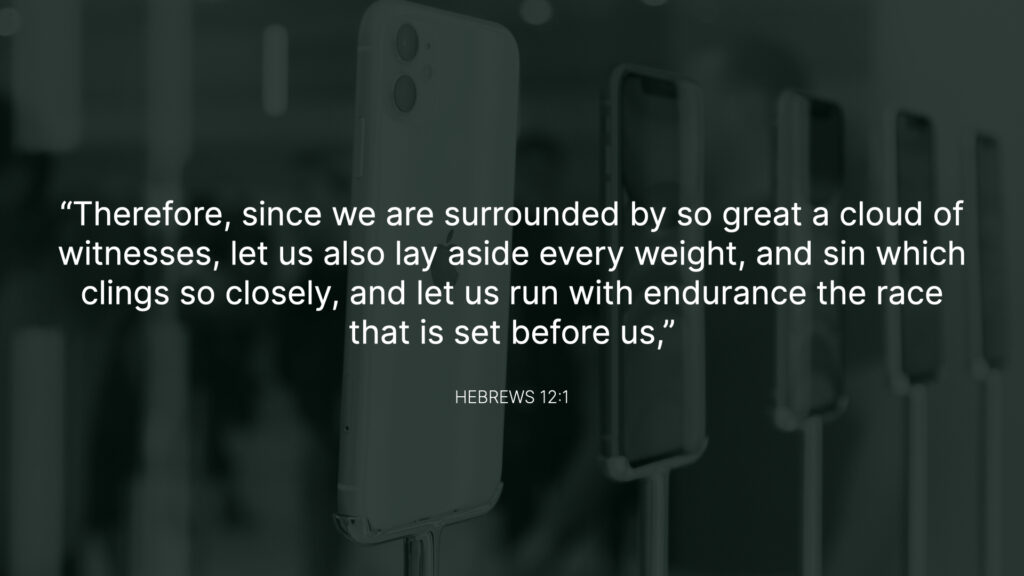
2. Take a Phone Fast
In Part One, I told the story of my attempt to switch from an iPhone to a smartphone, which only lasted a little over a month. This experience led me to conclude that, for most people, completely eliminating a smartphone is not a viable option. So it might surprise you that in step two, I suggest you take a break from your phone. But I’m not saying you need to give it up forever. Just take a break. Distance creates objectivity.
To show how this might help let’s take the example of a different addiction. Let’s say, for example, you had become enslaved to food. Somewhere along the line gluttony became your besetting sin. Eventually, however, the Lord convicted you that your love for food was not just unhealthy but indeed idolatrous. What would you do?
“I’ll never eat again!”
That strategy wouldn’t last very long, would it? Just because food had taken up an inordinate place in your affections doesn’t mean the proper solution would be to swear off food altogether. It just needs to be put back in its right place. And a good first step toward renegotiating your relationship with food might be to begin with a temporary fast.
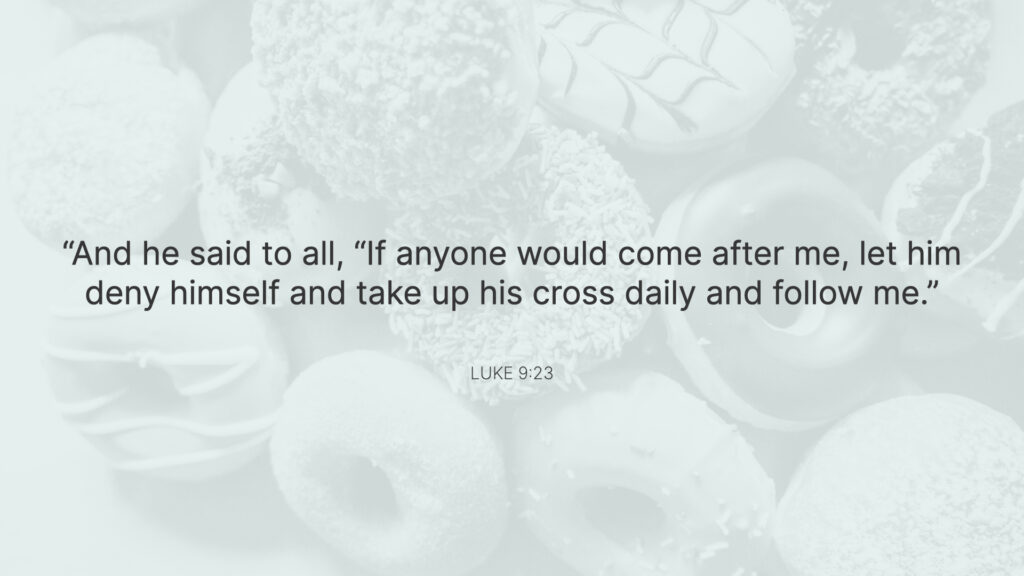
What if we applied this strategy to phone addiction?
For me, taking a break from my phone for 30 days, while it didn’t end up being a permanent change, had many lasting benefits:
- It untrained that impulsive urge to check my phone all the time
- Made me more intentional with my entertainment choices
- Gave me clarity on the importance of being present with friends and family
- Imparted a sense of objectivity about just how gross phone addiction looks from the outside (as I silently judged everyone whose faces were buried in their phones like mine was a few days before)
Some people call it a “phone fast” or a “tech sabbath.” Whatever you call it, if you’re feeling that your phone has taken up too great a place in your time and heart, try taking a break for while.
Take it slow at first. Maybe go to the grocery store without your phone. Then try going a full day without it. Then maybe commit to leaving it off during a week-long vacation. Just because these changes aren’t permanent doesn’t mean they aren’t beneficial.
If taking a break from your phone sounds extreme, that might be a good sign it’s exactly what you need.
3. Make Healthier Diversions Easier
Smartphones weren’t really a thing yet when I was in college. So I often carried around a notebook and a pocket Bible. When I had a spare moment to kill some time, I’d write or read.
It used to be that I’d say a quick prayer while waiting for the bus, read a Psalm while in line, or jot down thoughts while waiting for a friend to meet me. Now if I don’t deliberately plan for them, they simply don’t happen. I go on my phone instead.
One thing I’ve come to appreciate in the past year is how so many of the things that help us grow happen in the margins of life; those spare moments of attention that appear between appointments. But our phones devour the margins. It’s just easier to choose the boredom-killing dopamine candy on your screen than a healthier diversion.
If you want to redeem those margins of life to more productive ends, try changing your environment. Just as I used to carry that pocket Bible, consider some ways you might keep better diversions on hand for when there’s some time to kill.
Weight-loss experts will tell you to stock your house with healthy snacks instead of junk food. Then when you get the craving to snack, it’s easier to choose the healthy option than to drive to the store for the junk. Similarly, keeping a few good books, a paper Bible, or other productive diversions around can help replace distracted phone time with focused growth time.
Along these lines, you can also change the settings on your phone and more carefully choose what apps you allow on your phone itself.
4. Fight Fire with Fire
The fourth step on your smartphone emancipation journey is to fight fire with fire. You can use technology to make your technology less addictive.
Here are a few suggestions.
Freedom
I use the Freedom app on all my devices, a VPN that works on any phone, computer, or tablet. I create block lists and set up recurring focused times, like a session that blocks social media & distracting websites every morning until after breakfast. It takes willpower out of the equation.
Covenant Eyes
If some of your struggles with your devices have more to do with the content your viewing than just distraction in general, Covenant Eyes is a great suite of software to help you avoid temptation.
I made this video showing how Covenant Eyes works:
Opal
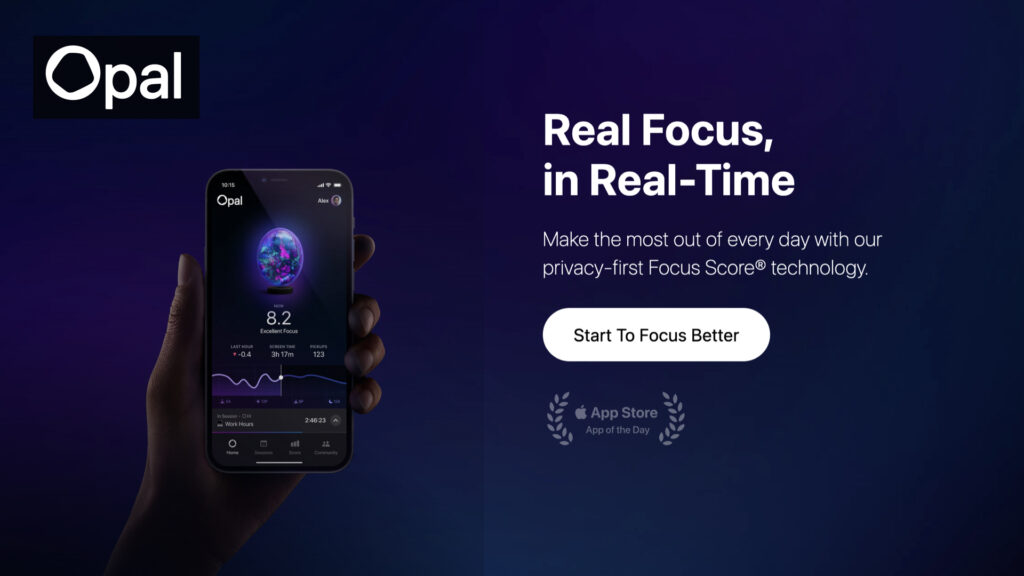
Opal is a newer player in the fire-fighting-fire genre of apps. It’s iOS only and instead of using a VPN, it leverages the iPhone’s Screen Time feature to give you granular control over what you have access to on your phone and when.
One Sec
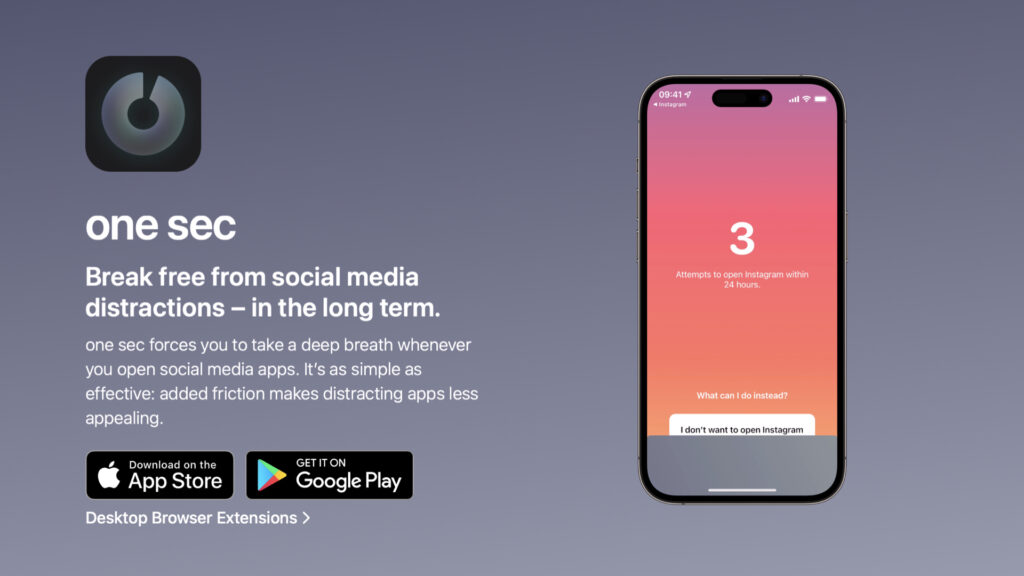
One Sec takes a different approach to breaking habits by forcing a moment to decide if you really want to open distracting apps, adding extra friction to muscle-memory responses, and making it more intentional.
5. Create Rules for Yourself
The last step for fighting phone addiction is to create some rules for yourself. By rules, I mean black-and-white decisions you’ve made in advance for how you’ll use your phone.
Here are some examples:
- No games on the phone
- The phone never comes into the bedroom
- No social media apps installed
- The phone stays on the charger when at home
- No phone before 8 am or after 8 pm
These are rules for you and you alone, not things to legalistically judge others by. Having rules like these help you make decisions about distraction based less on how you’re feeling in the moment and more on your better judgment.
I have a problem with overdoing it with video games so I don’t keep games on my phone (except once a year at Christmas when I let myself go crazy for a couple of days). This saves me from installing apps I know will be distracting.
Life is short, our calling great, and distractions many. Master your phone or it will master you.
Here are some further resources on this topic:
- 12 Ways Your Phone Is Changing You by Tony Reinke
- Why technology makes our lives easier yet more meaningless
- My book, A Student’s Guide to Gaming, addresses video game addiction specifically and at length.


I have never come across someone who spent the time to dive deep into productivity as a Christian in the ways you have. Thank you, thank you! I don’t even remember how I came across you but I’m so thankful for the time you spend putting this all together, speaking on it, and your overall obedience to the call God has placed upon your life.
Thanks so much for the encouragement, Amber! Pray these resources will be a blessing to you.
I appreciated your well-thought out and balanced approach. I am sharing part 1 & 2 with my 17yo son. The right perspective makes all the difference. “Remember: the goal isn’t to reduce screen time, it’s to live a Christ-honoring life.” Getting the why right, helps in doing right.
Have you seen the new app by the same folks who did PrayerMate? Redeeming Time is the name, you put in how long you have and it tells you what reading you could do in the Bible.
Hadn’t seen that. Looks great! Thanks for the tip, David.